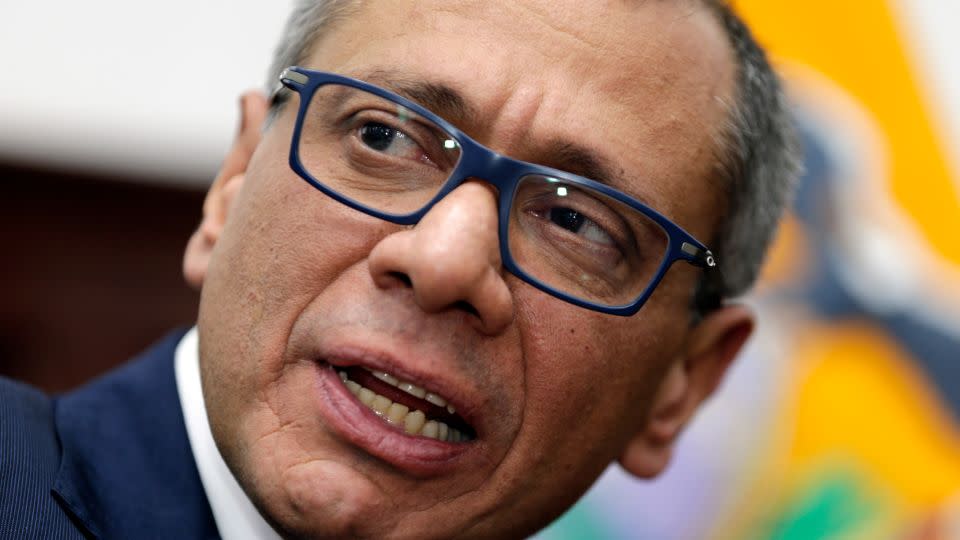‘Outrage against international law’: Mexico breaks diplomatic ties with Ecuador over embassy raid
- Oops!Something went wrong.Please try again later.
Mexico is breaking diplomatic ties with Ecuador after police raided its embassy in Quito to arrest former Ecuadorian Vice President Jorge Glas, who had been seeking asylum there.
Confirming the move in a statement to CNNE, a foreign ministry spokesperson said all Mexican diplomatic staff would leave Ecuador immediately.
Mexico decried the raid as “an outrage against international law,” while the United Nations voiced concern. Under diplomatic norms, embassies are generally considered protected spaces.
A rift between the two Latin American countries had been growing for several days, culminating Friday in Mexico’s decision to grant political asylum to Glas, who served as vice president under leftist ex-President Rafael Correa between 2013 and 2017.
Convicted twice on corruption charges, Glas says he is the subject of political persecution and had been sheltering inside the embassy.
But on Friday, Mexican president Andrés Manuel López Obrador, on his official X account, said he had been informed that “police from Ecuador forcibly entered” the embassy and took Glas – who “was a refugee and processing asylum because of the persecution and harassment he faces.”
Video from the scene showed police officers massing around the embassy, some armed.
A statement released by Ecuador’s government on X also confirmed the arrest.
Glas was “sentenced to imprisonment by the Ecuadorian justice system,” the statement from Ecuador’s government read, and was “arrested tonight and placed under the orders of the competent authorities.” He had been granted diplomatic asylum “contrary to the conventional legal framework,” the government said.
Glas has since been transferred to a maximum-security prison in Guayaquil known as La Roca, the national prisons agency SNAI announced Saturday.
He had most recently been accused by Ecuadorian authorities of embezzling government funds meant to help rebuild after a devastating 2016 earthquake.
“What you have just seen is an outrage against international law and the inviolability of the Mexican embassy in Ecuador,” Roberto Canseco, head of chancellery and policy affairs of the Mexican embassy, told a reporter from CNNE, calling Glas’s arrest “totally unacceptable.”
“It is barbarism,” Canseco added. “It is impossible for them to violate the diplomatic premises as they have done.”

At a news conference Saturday, Ecuadorian Foreign Minister Gabriela Sommerfeld said the decision to raid the Mexican embassy and arrest Glas was made “in the face of a real risk of imminent escape.”
Sommerfeld also accused Mexico of violating the principle of non-intervention by letting Glas stay in the embassy and evade an order to appear before authorities in a corruption probe.
The minister dismissed Mexico’s claim that Glas was being politically prosecuted, saying: “For Ecuador, no criminal can be considered a politically persecuted person when he has been convicted with an enforceable sentence and with an arrest warrant issued by the judicial authorities.”
Mexico plans to lodge a complaint with the International Court of Justice to denounce the Ecuadorian police’s actions, the spokesperson for Mexico’s foreign secretary added.
Secretary of Foreign Affairs Alicia Bárcena said there had been no prior contact with Ecuador’s foreign ministry about the arrest and Canseco was physically attacked during the raid. Video shows Canseco scuffling with police outside the embassy and being dragged to the ground.
Adding to current tensions was López Obrador’s apparent criticism of Ecuador’s recent elections, saying the 2023 run-off vote took place in a “very strange” manner and suggesting presidential candidates had used the media, presidential candidate Fernando Villavicencio’s assassination and overall violence in their favor while campaigning.
After that comment, Ecuador declared Mexico’s ambassador to the country “persona non grata,” meaning they would have to leave the country in short order.
UN Secretary-General António Guterres was “alarmed” by the forced entry, according to a statement on Saturday, saying the “violations jeopardize the pursuit of normal international relations.”
His spokesman, Stéphane Dujarric, said Guterres reaffirmed “the cardinal principle of the inviolability of diplomatic and consular premises and personnel.”
The dramatic rupture in relations sent shock waves through the region, with Latin American leaders swiftly condemning Ecuador’s raid on the embassy.
In a statement, Colombian President Gustavo Petro said Glas’s right to asylum had been “barbarically violated” and called for an urgent examination of the “breach of the Vienna convention by a member state” conducted by international bodies, including the Organization of American States.
Nicaragua also said Saturday it would break all diplomatic relations with Ecuador following the raid.
Eric Farnsworth, a former US State Department official who now heads the Washington office of the Council of the Americas and the Americas Society, called Ecuador’s move “impulsive and unnecessary.”
It “turns a criminal into a victim and gives opponents a rally point against (Ecuadorian President Daniel Noboa) whom they despise,” he wrote on X, adding it ignites a “state-to-state crisis with Mexico at a tough time.”
Ecuador, once seen as an island of peace in the region, has been convulsed by violence in recent years as powerful drug trafficking organizations established operations throughout the country.
After violence broke onto the streets in January, Noboa took the extraordinary step of declaring an “internal armed conflict” in the country, ordering Ecuador’s armed forces to “neutralize” members of more than 20 gangs, which he labeled as terror groups.
“The underlying story here is Latin American leaders who increasingly believe it’s necessary to violate the constitution,” said Brian Winter, editor-in-chief of Americas Quarterly, “or in this case break diplomatic convention because of the ‘emergency’ generated by organized crime.”
CNN’s Ana Maria Canizares, Ivonne Valdes, Abel Alvarado, Duarte Mendonca, Richard Roth, Chloe Liu and Juan Paz contributed to this report.
For more CNN news and newsletters create an account at CNN.com

